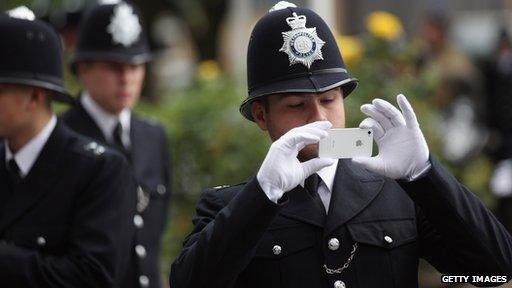UK police seek data access 'every two minutes'
- Published

The number of requests for communications data amounted to 670 a day across UK police forces
British police forces made 733,237 requests to view communications data over a three-year period, according to a new report by campaign group Big Brother Watch, external.
Communications data includes the "who, where and when" - but not the actual content - of personal texts, emails, phone calls and web searches.
It amounted to one request almost every two minutes, the group said.
The Home Office said the data is a "vital tool" for public safety.
Currently the police have to issue a request within their own force before they are allowed to contact the holder of the data they seek - such as an internet service provider or mobile phone company.
On average, 96% of those requests were approved, the report continued.
Big Brother Watch argued in its report that communications data "can paint a vivid and intrusive picture of our lives, including who our friends, family and work colleagues are, where we travel, live, work, socialise and holiday and the websites we visit online" even without the explicit content of the data being revealed.
Regionally, the Metropolitan Police made the largest number of requests during the research period - 177,287 between January 2012 and January 2015, while Thames Valley Police made the smallest with 17,562.
The information was obtained under the Freedom of Information Act.
"It is absolutely vital that our police and security services are able to obtain communications data in certain, limited circumstances, to protect the public and ensure national security," said a Home Office spokesperson.
"This information helps to disrupt terrorist plots, smash criminal networks and keep us safe and it is a government priority to ensure our legislation is updated to deal with changing threats and evolving technologies."
Controversial new laws to give police and spies greater powers to monitor internet and phone use were included in the Queen's Speech last week.
Big Brother Watch is calling for more transparency from individual forces regarding how requests are authorised and the type of crime the data is used to fight.
It also recommended judicial involvement as a final step in the approval process.
"Should the government adopt these recommendations, the general public will be better informed about how their communications can be obtained, analysed and used.
"It will also provide the much needed clarity on how police and other organisations work with the technology companies to access this information," the group said.
- Published27 May 2015

- Published23 January 2015
